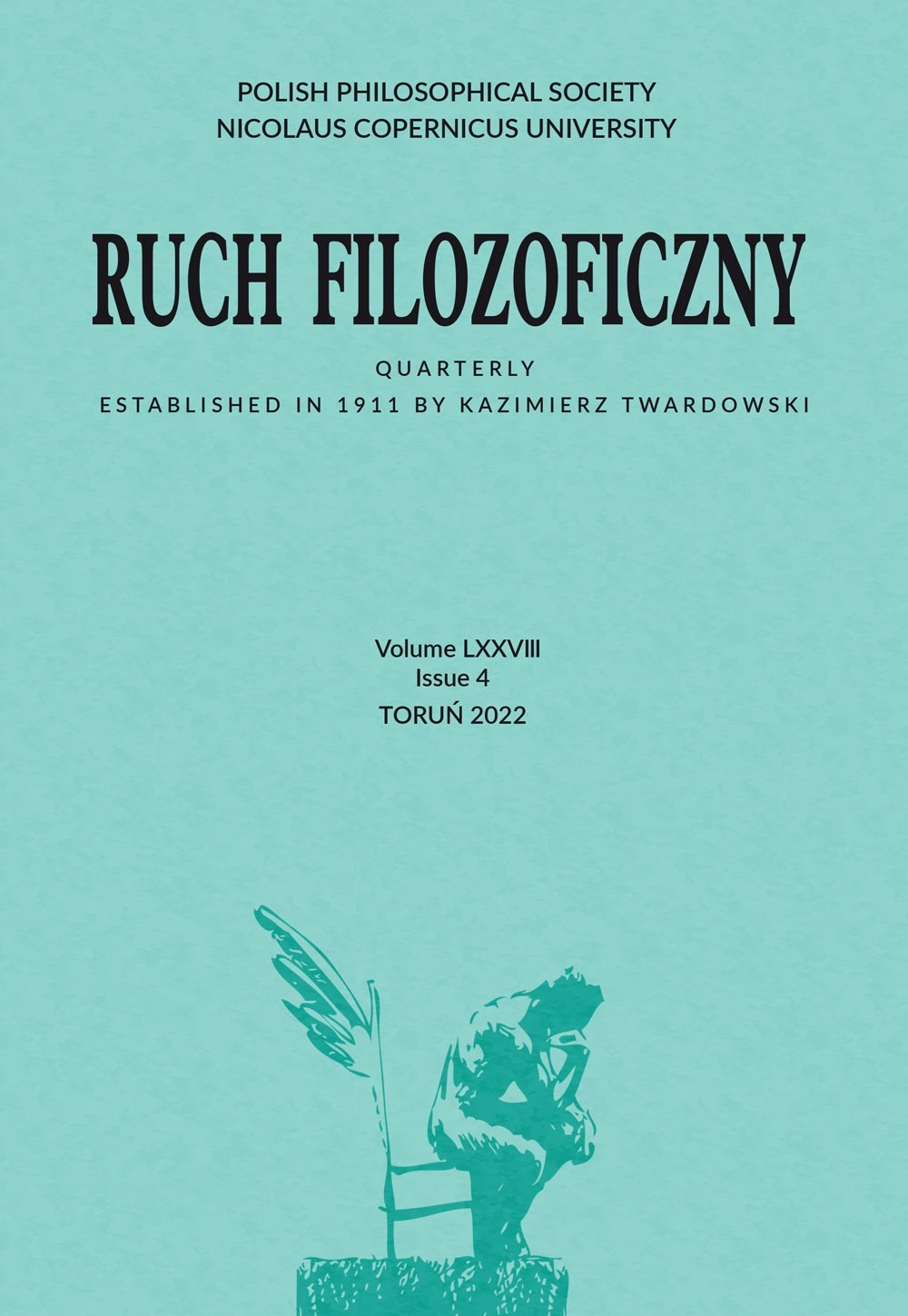Jednostka przeciw państwu
DOI:
https://doi.org/10.12775/RF.2022.032Słowa kluczowe
anarchizm, indywidualizm, korporacje, Spooner, Nock, RothbardAbstrakt
W artykule są przedstawione sylwetki trzech amerykańskich myślicieli związanych z tradycją indywidualistycznego anarchizmu. Są to: Lysander Spooner (1808–1887), Albert Jay Nock (1870–1945) i Murray Newton Rothbard (1926–1995). Myśliciele ci zajmowali się nie tylko działalnością pisarską, lecz byli jednocześnie aktywnymi uczestnikami ówczesnego życia politycznego. Ich zdaniem państwo, którego geneza jest oparta na przemocy i podboju, oraz jednostka to najwięksi wrogowie. Państwo postrzegali jako największe zagrożenie dla wolności jednostki, gdyż gwałciło zasady prawa naturalnego, które z kolei miało stanowić moralny fundament społeczeństwa. Państwo było więc, w opinii tych myślicieli, czymś z natury niesprawiedliwym, ponieważ siłą i wbrew woli swoich obywateli zmuszało ich do posłuszeństwa. Historię postrzegali oni nie w kategoriach walki klas, lecz walki jednostki resp. społeczeństwa z państwem.
Spooner porównywał państwo do bandy rabusiów i morderców (ceniąc ich jednak wyżej niż państwo) i utrzymywał, że konstytucja nie wiąże w żaden sposób obywateli, gdyż nie została przez nich osobiście podpisana, a rząd nie ma żadnej władzy ponad tę, która została mu przekazana przez wolne jednostki.
Nock wskazywał na stopniowe zawłaszczanie przez państwo („zawodowych kryminalistów”) kompetencji należących do społeczeństwa i przeciwstawne cele jednego i drugiego. Odróżniał rząd, którego celem jest obrona jednostek i sprawiedliwość, od państwa, którego celem jest, oparta na stworzonym przez siebie prawie, grabież.
Rothbard postulował zniesienie państwa jako konsumenta podatków i zastąpienie go porządkiem anarchokapitalistycznym, którego fundamentem będzie własność prywatna.
Koncepcje Spoonera, Nocka i Rothbarda, choć wymierzone przeciwko państwu, nie miały jedynie negatywnego charakteru. U ich podłoża leżało przede wszystkim dobro jednostek. Dla Spoonera byli to przede wszystkim robotnicy, dla Nocka obywatele, a dla Rothbarda przedsiębiorcy i właściciele. Fakt ten jest godny podkreślenia, gdyż często krytyka anarchizmu sprowadza się do zarzutów o radykalizm i utopijność, bez uwzględnienia jego protekcjonistycznego charakteru. W artykule, oprócz zreferowania stanowisk amerykańskich indywidualistycznych anarchistów, zwrócimy uwagę na pozytywne aspekty krytyki państwa i pokażemy, że już w XIX i XX wieku anarchiści rozpoznali pewne mechanizmy władzy, które występują ze szczególnym nasileniem także i dziś.
Bibliografia
Block Walter. 2006. „Kevin Carson as Dr Jekkyl and Mr Hyde”. Journal of Libertarian Studies 20(1) (Winter): 35–46.
Carson Kevin. „Studies in Mutualist Political Economy”. Dostęp 18.02.2021. https://theanarchistlibrary.org/library/kevin-carson-studies-in-mutualistpolitical-economy.
Murray Charles. 2001. Bez korzeni, przeł. Paweł Kwiatkowski. Poznań: Wydawnictwo Zysk i S-ka.
Nock Albert Jay. 1928. On Doing the Right Thing, and Other Essays. New York–London: Harper Brothers.
Nock Albert Jay. 2005. Państwo – nasz wróg, przeł. Leszek S. Kołek. Lublin–Rzeszów: Instytut Liberalno-Konserwatywny, Wydawnictwo Prestige.
Piotrowski Grzegorz. 2016. „Od postanarchizmu do pop-anarchizmu: współczesne interpretacje idei anarchistycznych”. W: Studia z dziejów anarchizmu (2). W dwustolecie urodzin Michaiła Bakunina, red. Radosław Skrycki, 3–4. Szczecin.
Raimondo Justin. 2016. Przeciw państwu, przeł. Jakub Woziński. Kraków: Wydawnictwo Nowy Wspaniały Świat.
Rothbard Murray N. 1969. „Confiscation and the Homestead Principle”. The Libertarian Forum 1(6): 3–4.
Rothard Murray N. 1975. Conceived in Liberty, vol. 1. New Rochelle–New York: Arlington House.
Rothbard Murray N. 2004. O nową wolność. Manifest libertariański, przeł. Witold Falkowski. Warszawa: Fundacja Odpowiedzialność Obywatelska, Oficyna Wydawnicza Volumen.
Rothbard Murray N. 2009. Interwencjonizm, czyli władza a rynek, przeł. Rafał Rudowski. Chicago–Warszawa: Fijorr Publishing.
Rothbard Murray N. 2010. Etyka wolności, przeł. Jakub Woziński, Jan M. Fijorr. Chicago–Warszawa: Fijorr Publishing.
Rothbard Murray N. 2010. Egalitaryzm jako bunt przeciw ludzkiej naturze, przeł. Krzysztof Węgrzecki. Warszawa: Fijorr Publishing.
Sękowski Stefan. 2010. W walce z wujem Samem. Anarchoindywidualizm w Stanach Zjednoczonych Ameryki w latach 1827–1939. Warszawa: Biblioteka Wolności.
Shone Steve J. 2010. Lysander Spooner: American Anarchist. Lexington Books.
Spooner Lysander. The Natural Law, rozdz. II, sek. I. Dostęp 18.02.2022. https://oll.libertyfund.org/page/oll-reader-71.
Spooner Lysander. 1886. A Letter to Grover Cleveland, on His False Inaugural Address, the Usurpations and Crimes of Lawmakers and Judges, and the Consequent Poverty, Ignorance, and Servitude of the People. Dostęp 18.02.2022. https://oll.libertyfund.org/title/spooner-a-letter-to-grover-cleveland.
Spooner Lysander. 1971. The Collected Works of Lysander Spooner, 6 vols. Red. Charles Shively. Weston, Mass.: M and S Press.
Spooner Lysander. 2008. Nie zdrada, przeł. Stefan Sękowski. Lublin–Warszawa: Wydawnictwo Prohibita.
Warren Josiah. 1856. [bez tytułu], Periodical Letter, vol. 1.
Warren Josiah. 1967. Equitable Commerce. A New Development of Principles as Substitutesfor Laws and Governments, for the Harmonies Adjustment and Regulation of the Pecuniary, Intellectual and Moral Intercourse of Mankind Proposed as Elements
of New Society. New York: B. Franklin.
Pobrania
Opublikowane
Jak cytować
Numer
Dział
Licencja
Prawa autorskie (c) 2023 Dariusz Juruś

Utwór dostępny jest na licencji Creative Commons Uznanie autorstwa – Bez utworów zależnych 4.0 Międzynarodowe.
Statystyki
Liczba wyświetleń i pobrań: 935
Liczba cytowań: 0



